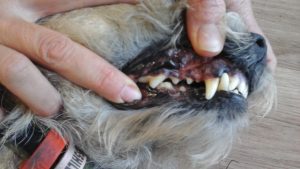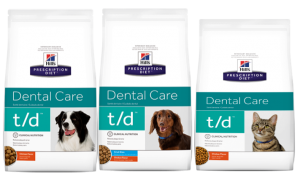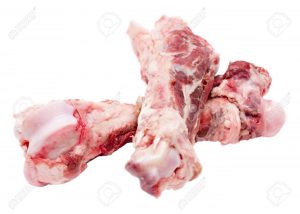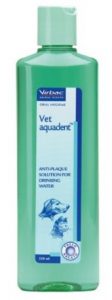Where does smelly breath come from?
Bad breath is caused by bacteria in your pets mouth, extreme bad breath can be a sign of significant health issues. Dental health care is an important part of pet ownership. If your pet does have bad breath, have a look and see if their gums are red or if they have a visible build up of tartar. If this is the case, it is important you take action by booking them in for a dental check with your veterinarian.
Ongoing Dental Care at Home
After your pet’s teeth have been scaled and polished, the surfaces of each tooth will be clean, however you need to take steps at home to ensure the teeth remain healthy. Outlined below are our recommendations for preventing the build up of plaque and development of periodontitis (dental disease) again.
1. Teeth Brushing
Brushing your pet’s teeth DAILY is ideal.
You can use either a plastic finger brush or a SOFT children’s toothbrush. Do NOT use human tooth paste as these are not designed to be swallowed. You can purchase animal tooth paste that is safe for your pet to swallow and is also usually chicken or beef flavoured, which makes brushing a more enjoyable experience.
Tooth brushing sometimes takes a bit of training, patience and persistence. Tips for tooth brushing:
- Start slowly, initial attempts may only last 30 – 60 seconds total
- Start with just toothpaste on your finger and rub along the teeth – pets usually like the taste of the toothpaste which makes brushing a more pleasant activity
- When your pet is comfortable with the above, then introduce the toothbrush with paste
- Start at the front of the mouth and work backwards
- Brush in a circular motion with gentle pressure
- You only need to brush the outside surfaces of the teeth, the tongue

- Always reward your pet for good behaviour
2. Dental Diets
High quality dental specific diets, such as Hill’s T/D or Royal Canin Dental, are formulated to prevent plaque and tartar build up. These are complete diets, meaning that they are safe to feed as the sole component of your pets diet.
3. Chewing Bones
Chewing on RAW meaty bones is great for cleaning teeth. The bone you choose should always be bigger than your dogs head, so that it cannot be swallowed. The best bones to feed are large beef thigh bones, sometimes referred to as ‘dinosaur’ bones. If the bone is cut, it should not be cut length ways. Raw bones can be fed up to 2-3 times per week.
Please be aware that there are also inherent risks associated with bones – the most common that we see are fractured
teeth, bones stuck in the mouth and sometimes intestinal obstructions if large portions of bone are swallowed. Bones should always be given under supervision and chewed bones should be disposed off.
NEVER FEED COOKED BONES. Cooked bones can splinter when chewed and cause severe intestinal damage.
4. Dental treats and chews
Chews such as pigs ears, trotters, rawhide, dentabones etc encourage your pet to chew, and this chewing action does aid in removal of plaque. However these should not be relied on as a sole form of dental prevention as they are less effective than than those mentioned above. These products could be fed once weekly if desired.
5. Dental Toys
There are some specifically designed dental chew toys on the market which can be helpful in encouraging chewing. These toys are a beneficial aid in dental health, but must not be reliable upon solely. Please remember that tennis balls are not suitable toys to chew on as the material of the ball acts like sand paper and cause irreversible damage the tooth enamel.
6. Grooming
Certain breeds of dogs with long hair around their muzzles/mouths, will often have hair wrapped around the teeth and embedded in the gums, which leads to gingivitis and worsening of dental disease. In these animals we would recommend keeping the hair around their mouths clipped short.
- Hexarinse – A daily mouth rinse that helps to aid in the prevention of plaque accumulation, gingivitis and bad breath
- Plaque Off – A daily dietary supplement that aims to reduce plaque formation
- Aquadent – A pleasant tasting water additive that helps to reduce bad breath and control plaque
We still recommend having your pets teeth checked every 6 months. Following a dental health care plan at home will certainly help reduce the likelihood of developing periodontal disease and extend the time between professional scale and polishing.



